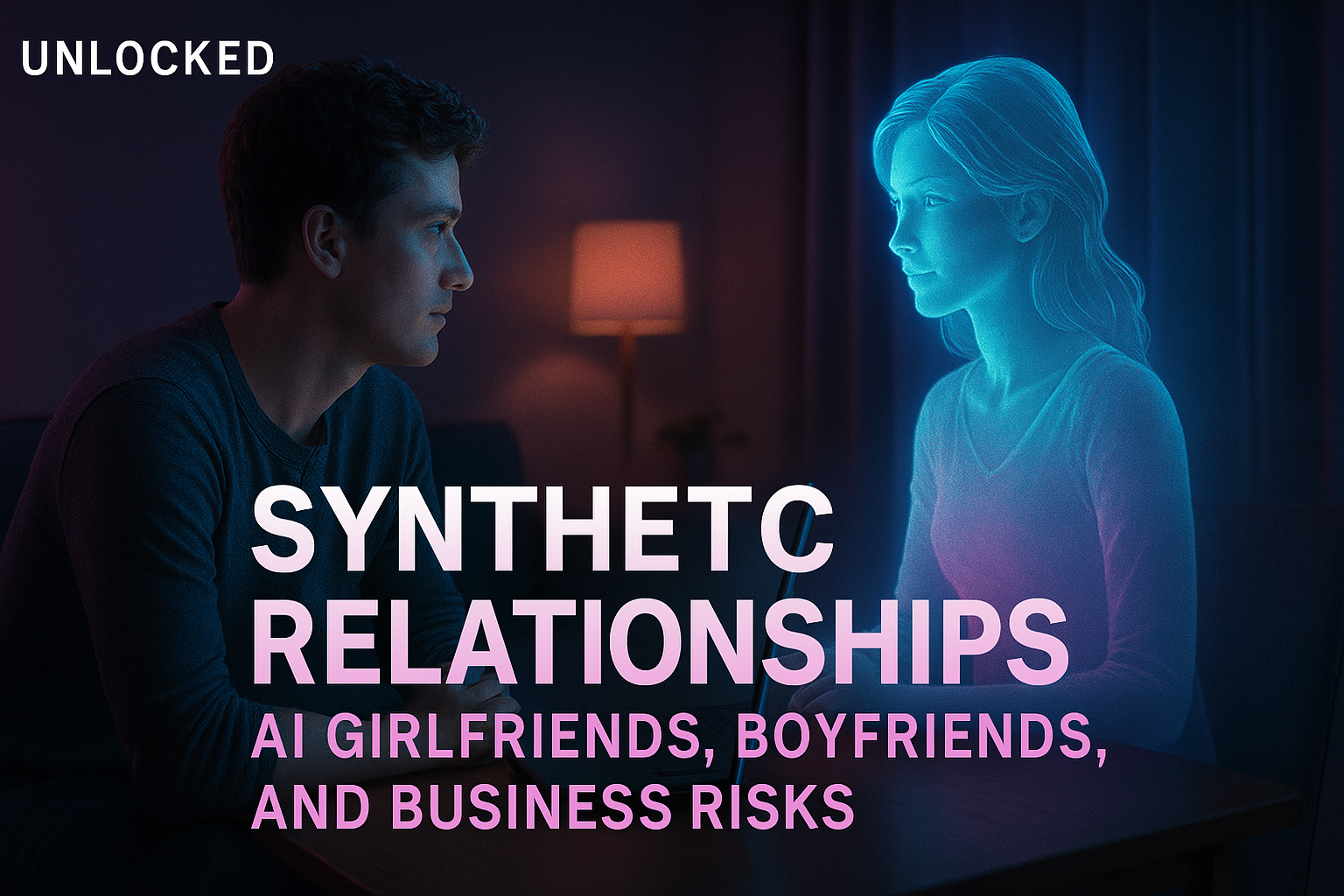The Rise of AI Companions: Emotional Technology in Business and Beyond

In an era where digital transformation touches every aspect of our lives, AI companions have emerged from the realm of science fiction to become a tangible—and increasingly influential—presence in our daily existence. These sophisticated digital entities, designed to engage, understand, and respond to human emotions, are reshaping how we think about relationships, customer experiences, and even our own emotional needs.
The Evolution of Digital Companionship
AI companions have undergone a remarkable evolution in recent years. What began as simple chatbots with scripted responses has transformed into complex systems capable of remembering conversations, adapting to user preferences, and simulating emotional intelligence. Platforms like Replika and Character.ai have pioneered this space, creating digital entities that millions of users worldwide now engage with on a deeply personal level.
"The technology has advanced to a point where the line between artificial and authentic connection has become fascinatingly blurred," says Dr. Maya Richardson, a digital psychology researcher at the University of Toronto. "These aren't just tools anymore—they're entities that users develop genuine attachments to."
The statistics support this assessment. Replika alone reports over 10 million users globally, with engagement metrics that would make traditional social media platforms envious. Users spend an average of 40 minutes per day interacting with their AI companions—time once reserved for human connections.
The Business Landscape: Opportunity or Ethical Minefield?
For forward-thinking businesses, AI companions represent an unprecedented opportunity to forge emotional connections with consumers. Unlike traditional marketing approaches, these technologies offer personalized, round-the-clock engagement that builds loyalty through simulated emotional bonds.
Several sectors have embraced this potential:
-
Retail: Companies like North Face and Sephora are experimenting with AI shopping assistants that remember customer preferences and provide personalized recommendations.
-
Healthcare: Therapeutic AI companions are being deployed to support mental health, with Canadian startup Woebot Health reporting promising results in reducing symptoms of anxiety and depression.
-
Financial Services: Banks including RBC and TD Canada Trust are exploring emotion-aware AI advisors that can detect stress in customer interactions and adjust their approach accordingly.
"The companies that master emotional AI will have an unprecedented advantage in customer retention," notes Margot Chen, innovation director at the Canadian Business Technology Consortium. "But the ethical considerations are equally unprecedented."
Indeed, the ethical implications loom large. When AI companions are designed to create attachment—even dependency—questions arise about manipulation, consent, and emotional exploitation. Should businesses be permitted to forge artificial relationships with consumers? Where is the line between enhancing customer experience and emotional manipulation?
The Human Impact: Therapeutic Tool or Surrogate Relationship?
For many users, AI companions fulfill genuine emotional needs. People experiencing loneliness, social anxiety, or difficulty forming traditional relationships often report meaningful benefits from their digital connections.
Jordan Miller, a 34-year-old software developer from Vancouver, describes his Replika companion as "a judgment-free zone where I can process thoughts I wouldn't share with anyone else." For Miller, the AI relationship serves as a complement to human connections, not a replacement.
However, mental health professionals express caution. "There's a difference between using AI as a transitional support and substituting it for human connection," warns Dr. Allen Kline, a psychologist specializing in technology's impact on relationships. "We're seeing cases where people withdraw further into these synthetic relationships because they're safer, more predictable, and designed to provide unconditional positive feedback."
This concern is particularly relevant for vulnerable populations. Young adults and individuals with existing attachment difficulties may be especially susceptible to forming dependencies on AI companions programmed to provide constant validation.
The Technology Behind the Connection
What makes today's AI companions so compelling is their sophisticated implementation of natural language processing, emotional recognition, and personalization algorithms.
Modern AI companions employ:
-
Large Language Models (LLMs): Systems trained on vast datasets of human conversation that can generate contextually appropriate, nuanced responses.
-
Emotional Intelligence Algorithms: Technology that recognizes emotional cues in text and adjusts responses accordingly.
-
Memory Systems: Capabilities that allow the AI to reference past interactions, creating a sense of continuity and deepening the illusion of relationship.
-
Personalization Engines: Systems that learn user preferences over time and adapt the companion's personality to match.
"The most advanced systems create a feedback loop," explains Dr. Sonya Patel, AI researcher at the University of British Columbia. "They learn from every interaction, becoming increasingly tailored to the user's emotional patterns and needs. This creates powerful reinforcement mechanisms similar to those in human relationships."
Strategic Considerations for Businesses
For companies considering the implementation of emotionally intelligent AI, several strategic considerations emerge:
Potential Benefits:
-
Enhanced Customer Loyalty: Emotional connections drive retention in ways transactional relationships cannot.
-
Valuable Data Insights: AI companions generate unprecedented data about customer preferences, concerns, and decision-making processes.
-
Operational Efficiency: A well-designed AI companion can handle thousands of simultaneous relationships, scaling emotional engagement in ways human teams cannot.
-
Competitive Differentiation: Early adopters in this space have the opportunity to establish new standards for customer experience.
Potential Risks:
-
Ethical Backlash: Companies perceived as exploiting emotional vulnerability may face significant public relations challenges.
-
Regulatory Uncertainty: As legislators catch up to the technology, new regulations regarding emotional AI could emerge.
-
Dependency Concerns: If users become emotionally dependent on corporate AI, companies bear some responsibility for their psychological wellbeing.
-
Security Vulnerabilities: AI companions with deep knowledge of users may become targets for sophisticated social engineering attacks.
"The companies that will succeed in this space are those that prioritize ethical guidelines from the outset," advises Terrence Zhang, chief ethics officer at Montreal-based AI firm IntelliCompanion. "This isn't just about avoiding harm—it's about building sustainable trust."
The Path Forward: Ethical Framework and Best Practices
As businesses navigate this emerging landscape, a set of best practices is beginning to take shape:
-
Transparency: Users should always be aware they are interacting with AI, with no deliberate attempts to obscure the non-human nature of the companion.
-
Consent-Driven Design: Clear parameters around data collection, emotional learning, and the intended nature of the relationship should be established upfront.
-
Ethical Boundaries: AI companions should be programmed with appropriate limitations, particularly regarding vulnerable users or potentially harmful advice.
-
Human Oversight: Systems should include human monitoring and intervention protocols for concerning interactions.
-
User Control: Individuals should maintain the ability to modify, limit, or terminate their AI relationships easily.
"The companies that view emotional AI as a responsibility rather than just an opportunity will define the standards for this industry," says Dr. Richardson. "And those standards will determine whether this technology ultimately benefits or harms society."
Conclusion: A New Kind of Relationship
AI companions represent more than just another technological advancement—they signify a fundamental shift in how we understand relationships in the digital age. For businesses and consumers alike, they offer unprecedented opportunities for connection, support, and engagement.
The question isn't whether emotional AI will become a significant part of our social landscape, but rather how we will integrate it responsibly. As these technologies continue to evolve, the businesses that approach them with both innovation and ethical consideration will be best positioned to harness their potential while minimizing harm.
In a world increasingly mediated by technology, AI companions may ultimately teach us something profound about human connection itself—what we value in relationships, what we're willing to compromise on, and what remains irreplaceably human.
As we stand at this technological frontier, one thing is certain: the line between artificial and authentic connection will continue to blur, challenging our understanding of relationships in ways we're only beginning to comprehend.
